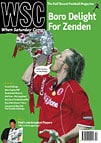 Ruud Gullit may have failed to bring “sexy football” to Newcastle, but he won’t try that when he takes over at Feyenoord. And the fans there won’t care, Ernst Bouwes writes
Ruud Gullit may have failed to bring “sexy football” to Newcastle, but he won’t try that when he takes over at Feyenoord. And the fans there won’t care, Ernst Bouwes writes
Situated at the “arse” of the Netherlands, where several rivers come together to spit Europe’s chemical waste into the North Sea, Rotterdam is a place where people love winning football matches by a dubious penalty or a deflected free-kick in the last minute. A world removed from the entertaining and high-quality football associated with Holland, Feyenoord fans mainly care for industrious, tough and ruthless players, the type who have won all sorts of trophies for their club since 1970. It is no surprise, therefore, that Ruud Gullit will be in charge for the start of next season.
No, really. Gullit’s expressed desire to play “sexy football” will haunt him forever in certain places, but he has not spoken of it since his return from Newcastle. In fact, he is now a strong advocate of “realistic football” and “discipline”. Before the 1994 World Cup he quit the national squad because he disagreed with coach Dick Advocaat over tactics. Gullit claimed the hot weather in Florida, where Holland played their group games, demanded an energy-saving, defensive style. Advocaat opted to play like Ajax, pressuring the opponents in their own half. Gullit’s dad suggested later that Ruud was fed up with the arrogance of the Ajax players in the squad, though this has never been officially confirmed.
As a TV pundit here, Gullit stresses over and again the importance of a tight defence and the will to win. Dutch coaches complain about “undeserved” defeats when the percentage of possession clearly states that their team had the upper hand. Gullit, however, mocks this and has often said that’s not how he won so many trophies at AC Milan. Jan Wouters and Gennaro Gattuso are among his favourite players. Trying to grind out a one-goal advantage, whatever it costs, with blatant disregard for those silly football romantics, that’s his thing.
The signing was not without controversy as both parties “forgot” that Gullit still worked for the Dutch federation, the KNVB. Last summer he was given the job of preparing the Under-19s for the FIFA World Youth Championship in 2005, which Holland will host. He was also to join Dick Advocaat and Wim van Hanegem as assistant coach at Euro 2004. When the Feyenoord deal was announced, the KNVB were unpleasantly surprised and demanded a hefty fee for the messing-up of their long-term plans. (Was Gullit being groomed to be Dutch national coach? We’ll never know.) Although current Feyenoord coach Bert van Marwijk was held to his contract last season after an approach by Schalke 04, chairman Jorien van de Herik now argues it would be heartless to deny the “Black Tulip” such a massive job. Gullit himself added that everyone at the KNVB knew coaching Feyenoord was his lifelong dream – surely the federation would not stand in his way? After the tears had been wiped away, the parties agreed on compensation. Going to Euro 2004, however, is now out of the question for Ruud.
Gullit’s publicly expressed enthusiasm for Feyenoord is genuine enough. He spent three years in Rotterdam, winning the double in 1984 in a team captained by Johan Cruyff. (Ajax thought Cruyff was finished and refused to extend his contract in 1983. As the ultimate revenge he asked Feyenoord if they were interested – they were.) Over the years Gullit repeatedly expressed his love for the club. More importantly, although he grew up in Amsterdam, Gullit has always been indifferent to Ajax and once declared that he had preferred to play for the reserve team of Haarlem, his first professional club, than Ajax A1, their best youth team. Such comments go down extremely well with the Feyenoord faithful, who are delighted with their new coach.
Just 18 months after winning the UEFA Cup the club are at a low ebb. The backbone of that team – Bosvelt, Emerton, Van Hooijdonk – left last summer and the high-cost replacements have made no impact. Now the club can only buy when they sell. Instead of introducing more expensive stars Gullit will probably create a system in which mediocre players can excel and the team’s performances are greater than the sum of its parts. There will be few glitzy football shows in the De Kuip stadium, but the 40,000 or more who turn up to every home game could not care less. They just want to see their team on top, whatever it takes. That could be a long-term process, but the supporters will be patient with their favourite Amsterdammer.
From WSC 206 April 2004. What was happening this month